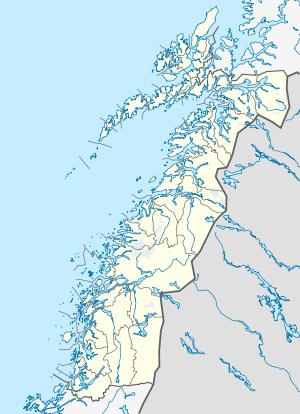Eiterå
| Eiteråga Eiterå | |
|---|---|
| Village | |
|
View of one of the farms | |
 Eiteråga Location in Nordland | |
| Coordinates: 66°23′48″N 14°40′04″E / 66.39667°N 14.66778°ECoordinates: 66°23′48″N 14°40′04″E / 66.39667°N 14.66778°E | |
| Country | Norway |
| Region | Northern Norway |
| County | Nordland |
| District | Helgeland |
| Municipality | Rana |
| Elevation[1] | 94 m (308 ft) |
| Time zone | CET (UTC+01:00) |
| • Summer (DST) | CEST (UTC+02:00) |
| Post Code | 8630 Storforshei |
Eiteråga or Eiterå is a village in the Dunderlandsdal valley in the municipality of Rana in Nordland county, Norway. The village is located along the Ranelva river about 7 kilometres (4.3 mi) east of the village of Storforshei and about 10 kilometres (6.2 mi) south of Dunderland. The European route E6 highway passes through the village. "Stjernen Art and Silver Gallery" is a local shop that produces pieces of jewellery from silver and precious stones.
The primary industry for Eiteråga is mainly farming. The Eiterå area was cleared for farming in 1723. Originally, the village was composed of two farms. Since 1749 the village have been centered on four farms, more or less equal in size. The farms were regulated by the Norwegian state in 1925.
River
There is a small river that passes through the village that is also named Eiteråga. The river name may mean "the cold river" which comes from the Old Norse word: "eitr". The name may also be derived from Proto-Germanic aitra-, meaning "something welling forwards". The river has its source in between the mountains Bomfjellet and Ørtfjellet.[2][3]
Media gallery
-

Eiteråa flowing down from the mountain
-

Eiteråa passing beneath a bridge at E6
-
Eiteråa passing beneath a bridge at E6
-
The outlet of Eiteråa into Ranelva
-
Eiterå farm
-
Eiterå farm
References
- ↑ "Eiteråga" (in Norwegian). yr.no. Retrieved 2011-12-22.
- ↑ Rygh, Oluf (1904). Norske Elvenavne. Kristiania: Etter offentlig Foranstaltning udgivne med tilføiede Forklaringer av K. Rygh. pp. 38–39.
- ↑ Petersson, H. (1956). Namn och Bygd. Tidsskrift for nordisk ortnamnsforskning, Lund. pp. 68–75.